Assessing student assessments: Part one of a conversation about the complicated issue of assessments in our schools
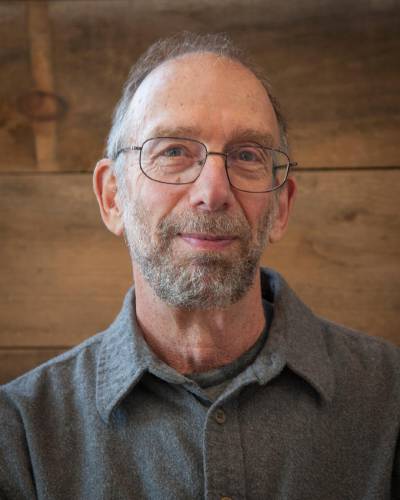
SELWYN Contributed photo/Trish Crapo
| Published: 03-29-2024 12:22 PM |
One of the responsibilities and challenges of every society is to educate their young people so they are ready to assume their roles as adults in the community. There is not one way to do this, and societies make choices based on their values, their cultures, and their needs. In the U.S., we have developed and maintained a public education system.
Since the purpose of education is to help our young people learn what they need to learn, one of the ways we might assess the effectiveness of our public educational system is to look at the quality of lives we are leading. Are we meeting the needs of our population, are we living in a manner that is sustainable and that is allowing us to thrive as individuals and as a society? Are our people happy and satisfied? Are their needs being met? Are our cities, towns and environment healthy and able to sustain us?
By those measures I would have to conclude that our children are not being well served. It is concerning, and our hyper focus on high-stakes testing is part of the problem.
I have previously communicated my concerns about the damage done by the high-stakes testing regime, so won’t repeat that here, but will focus on the many ways that the Massachusetts Comprehensive Assessment System (MCAS) narrows the education our students receive, leaving them less well educated. The students have little or no say in what they study, little to no say in how they learn it, no say in how they demonstrate what they have learned, and then are told by others whether they are good enough. They are taught to be passive recipients rather than active, self directed learners and are prevented from pursuing their own questions, concerns and interests. The curriculum is also narrowed; fewer electives, less science and social studies, less hands-on learning, fewer field trips, less recess, less of what engages and excites students. And then we wonder why absenteeism is increasing.
The issue is often framed as you are either for the MCAS or you are against assessment. Assessment is an essential aspect of learning, and teachers assess all day long. The issue is, does the assessment we are using serve to improve the teaching and learning in our schools. And the MCAS does not serve either teachers or students. Assessment is a complicated issue and I reached out to Jack Schneider, the Dwight W. Allen Distinguished Professor of Education and director, Center for Education Policy at University of Massachusetts Amherst, to get his thoughts. I am sharing excerpts from that conversation today and in the next column.
Doug Selwyn: Can you talk about how you got into your focus on assessment?
Jack Schneider: I got into this work because I had my heart broken by looking at the way that assessment was being used to tell stories about schools. I live in Somerville and when my daughter was 5 and began attending our then quite diverse local public school, the thing that I loved most about that school was that it represented our community. The reason we moved here was because there were dozens of different languages spoken in the schools, and there were people from all walks of life, socially, economically, ethnically and religiously. I knew that I could give her lots of things inside our home, but I couldn’t teach her how to get along with America inside my home alone. I couldn’t teach her how to treat everybody with dignity just on my own, that she had to actually encounter people in the world and that the best place for a young person to do that is in a school. The rating of our school, in this case it was in the Boston Globe, was so out of line with our experience in the school. The thing that was ironic was that the rating of the school was rooted in test scores and we know from educational research that test scores are first and foremost an indicator of factors that are outside of a school’s control like family wealth and that a school like ours was therefore destined to be rated poorly. That’s what got me into working on assessment and what kept me there was that assessment was doing other kinds of harm to the schools.
I also felt that assessment had gone off the rails because inside schools it was so often being used to convince young people that they were bad at school, which fundamentally runs counter to what I think school is so great at: showing us we’re all good at something and the world is so full of amazing things.
Article continues after...
Yesterday's Most Read Articles
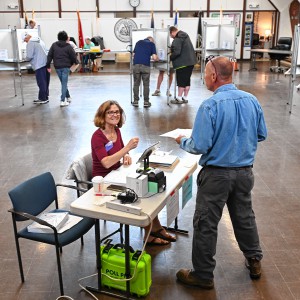 Political newcomer defeats Shores Ness for Deerfield Selectboard seat
Political newcomer defeats Shores Ness for Deerfield Selectboard seat
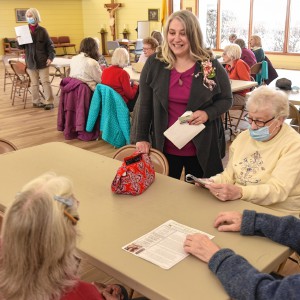 South County Senior Center opts not to renew church lease after rift over LGBTQ program
South County Senior Center opts not to renew church lease after rift over LGBTQ program
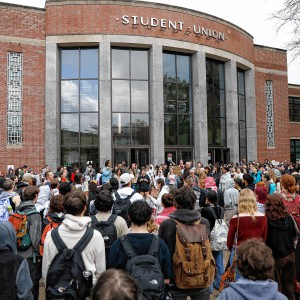 More than 130 arrested at pro-Palestinian protest at UMass
More than 130 arrested at pro-Palestinian protest at UMass
 As I See It: Between Israel and Palestine: Which side should we be on, and why?
As I See It: Between Israel and Palestine: Which side should we be on, and why?
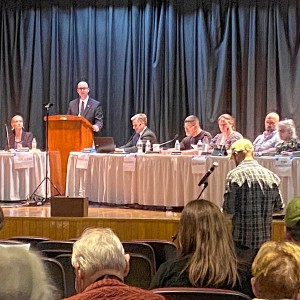 Moratoriums on large-scale solar, battery storage passed in Northfield
Moratoriums on large-scale solar, battery storage passed in Northfield
 Bridge of Flowers in Shelburne Falls to open on plant sale day, May 11
Bridge of Flowers in Shelburne Falls to open on plant sale day, May 11
I think these are solvable problems. I don’t think they’re easily solvable problems, but I think that it’s worth thinking about and talking about assessment and working on building better ways of measuring school quality and assessing what students know and can do because ultimately these are questions about values.
D: You have to have a clear sense of where you want to go, what your goals for education are before you can assess, right?
J: Yes. I mean, how do you know whether you’re getting close to your goal or your vision if you don’t have one?
D: For many of us the thought of assessment brings up memories of our own sweaty palms on test days, red marks all over our essays, or page after page of question after question on the year end tests, but that’s not all there is to assessment. Can you talk a little bit about the kinds of the ways in which assessment can and is used?
J: Assessment is about identifying what’s worth doing. When we are deciding what we want to assess, we are declaring that this has value. We are saying that this is some place we want to put particular attention. Assessment is also a mechanism for tracking our progress, which I think aligns with the idea that if it’s worth doing, it’s worth tracking our progress on. Education is a joint venture; it’s not just about students toiling away on their own. It’s students working with educators, with the support of families and communities, and in communities of learners. One of the things that assessment does is it lets us operate as communities. It provides information to people about how students are doing and how schools are doing.
D: Let’s just step outside of that and say, we’re assessing all the time in our lives, right?
J: When we teach our children how to ride a bike and then let them go for it on their own without holding on to the underside of the seat, that’s an assessment. When we cast our ballots in November, that’s an assessment. We are declaring this is something that we value, we are going to work towards a particular kind of outcome. We will be exercising some judgment here about our progress towards whatever our desired aim is, and we’ll be seeking to communicate with each other about that. I think that it’s fundamental to what we’re doing all the time when we’re doing things that we care about.
The second part of my interview with Jack Schneider will be in next month’s column.
Also: I am looking for current or former teachers who are willing to talk about a teacher who was their favorite teacher or their best teachers, for use in a future column. If you are interested please contact me at dougselwyn12@gmail.com.
Doug Selwyn taught at K-12 public schools from 1985 until 2000 and then at university as a professor of education until he retired in 2017. He is the chair of the Franklin County Continuing the Political Revolution education task force. You can reach him at dougselwyn12@gmail.com.

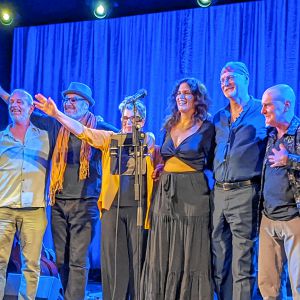 Sounds Local: Joni Mitchell tribute comes to Turners Falls: Big Yellow Taxi to perform ‘Court and Spark’ in its entirety, May 18 at the Shea
Sounds Local: Joni Mitchell tribute comes to Turners Falls: Big Yellow Taxi to perform ‘Court and Spark’ in its entirety, May 18 at the Shea On Mother’s Day, we’ll always have Paris: A crêpe recipe in honor of my French-speaking mother
On Mother’s Day, we’ll always have Paris: A crêpe recipe in honor of my French-speaking mother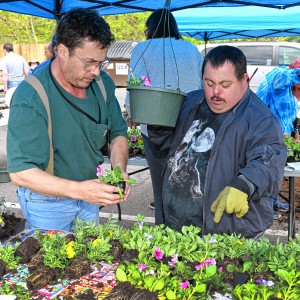 Providing opportunity for people to grow: The United Arc of Franklin County’s annual Gardening with Steve event a highlight of spring
Providing opportunity for people to grow: The United Arc of Franklin County’s annual Gardening with Steve event a highlight of spring Speaking of Nature: Capturing my Bermuda nemesis: The Great Kiskadee nearly evaded me, until I followed its song
Speaking of Nature: Capturing my Bermuda nemesis: The Great Kiskadee nearly evaded me, until I followed its song
